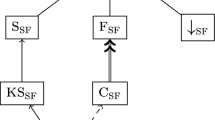Abstract
We discuss nonmonotonic reasoning in terms of consequence relations and corresponding operators. Based on the matrix consequence that gives the monotonic case, we define a restricted matrix consequence that illustrates the nonmonotonic case. The latter is a generalization of the relation of logical friendliness introduced by D. Makinson. We prove that any restricted single matrix consequence, although it may be nonmonotonic, is always weakly monotonic and, in the case of a finite matrix, the restricted matrix consequence is very strongly finitary. Further, by modifying the definition of logical friendliness relation formulated specifically in a proof-theoretic manner, we show a possibility of obtaining other reflexive nonmonotonic consequence relations, for which a limited result towards finitariness is proved. This leads to numerous questions about nonmonotonic consequence relations in the segment between the monotonic consequence relation based on intuitionistic propositional logic and logical friendliness.
Similar content being viewed by others
Notes
See, e.g., [6].
The property \((\text {j}^{\dag })\) appears only as a conclusion in (xi). Thus, if we challenge \((\text {b}^{\dag })\), we can possibly have \((\text {j}^{\dag })\) only in some exotic situations. Therefore, we will not be considering it.
Compare this with a remark by E. W. Beth, “The replacement of one axiom by another which is not equivalent to the first thus conversely may affect the import of the remaining axioms.” Cf. [2], chapter II.
The difference between parameters and constants is apparent only in semantics.
See, e.g., [3], theorem 1.3.22.
Makinson proved the strong finitariness of friendliness in a stronger form, however, weaker than the one exposed in this proposition. The condition imposed on \(\Lambda \) in Makinson’s version is \(\Delta \subseteq \Lambda \subseteq \Gamma \).
For the equality \(\mathbf{Cn} _{\mathbf{B }_2}=\mathbf{Cn} _{\textsf {Cl}}\) see [4], Sect. 4.3.5.
Compare with the notion of a sequent in [14].
See, e.g., [11], theorem IX.5.4.
References
Barwise, J.: An introduction to first-order logic. In Handbook of Mathematical Logic, volume 90 of Studies in Logic and the Foundations of Mathematics, pp. 5–46. North-Holland, Amsterdam (1977)
Beth, E. W.: Mathematical Thought. An Introduction to the Philosophy of Mathematics. Translated in part from the Dutch by Horace S. Glover. D. Reidel Publishing Co., Dordrecht, (1965)
Chang, C., Keisler, H.: Model Theory, volume 73 of Studies in Logic and the Foundations of Mathematics. North-Holland Publishing Co., Amsterdam, third edition (1990)
Citkin, A., Muravitsky, A.: Consequence Relations: An Introduction to the Tarski-Lindenbaum Method. Oxford University Press, Oxford (to appear) (2021)
Łukasiewicz, J., Tarski, A.: Untersuchungen über den Aussagenkalkül (German). Comptes rendus des séances de la Société des Sciences et des Lettres de Varsovie, CI III, 23:30–50. English translation: Investigations into the sentential calculus, in: [Tarski, 1956], pp. 38–59; also in: [Tarski, 1983], pp. 38–59 (1930)
Makinson, D.: Bridges from Classical to Nonmonotonic Logic, volume 5 of Texts in Computing. King’s College Publications, London (2005)
Makinson, D.: Logical friendliness and sympathy. In: Logica Universalis, 1st edn., pp. 191–205. Birkhäuser, Basel (2005)
Makinson, D.: Logical friendliness and sympathy. In: Logica Universalis, 2nd edn., pp. 195–224. Birkhäuser, Basel (2007)
Muravitsky, A.Y.: Satisfaction and friendliness relations within classical logic: Proof-theoretic approach. In Bosch, P., Gabelaia, D., and Lang, J., editors, Logic, Language, and Computation, 7th International Tbilisi Symposium on Logic, Language, and Computation, TbiLLC 2007, Tbilisi, Georgia, October 1-5, 2007. Revised Selected Papers, volume 5422 of Lecture Notes in Computer Science, pp. 180–192. Springer (2007)
Muravitsky, A.Y.: Consequence operators related to logical friendliness. In Gaindric, C. and Cojocaru, S., editors, Proceedings IIS, International Conference on Intelligent Information Systems, August 20–23, 2013,Chisinau, Moldova, pp. 126–132. Institute of Mathematics and Computer Science (2013)
Rasiowa, H., Sikorski, R.: The Mathematics of Metamathematics. PWN—Polish Scientific Publishers, Warsaw, third edition. Monografie Matematyczne, Tom 41 (1970)
Tarski, A.: Logic, Semantics, Metamathematics. Papers from 1923 to 1938, p. 1956. Oxford at the Clarendon Press, Translated by J. H. Woodger (1923)
Tarski, A.: Logic, Semantics, Metamathematics. Hackett Publishing Co., Indianapolis, IN, second edition. Papers from 1923 to 1938, Translated by J. H. Woodger, Edited and with an introduction by John (1983)Corcoran
Troelstra, A.S., Schwichtenberg, H.: Basic Proof Theory. Cambridge Tracts in Theoretical Computer Science, vol. 43. Cambridge University Press, Cambridge (2000)
Wójcicki, R.: Theory of Logical Calculi. Synthese Library, vol. 199. Kluwer Academic Publishers, Dordrecht (1988)
Acknowledgements
I would like to express my gratitude to one of the two referees whose constructive criticism led to a significant revision of the original version of this paper and, hopefully, to the clarity of the results presented.
Author information
Authors and Affiliations
Corresponding author
Additional information
Publisher's Note
Springer Nature remains neutral with regard to jurisdictional claims in published maps and institutional affiliations.
Rights and permissions
About this article
Cite this article
Muravitsky, A. On Nonmonotonic Consequence Relations. Log. Univers. 15, 227–249 (2021). https://doi.org/10.1007/s11787-021-00275-4
Received:
Accepted:
Published:
Issue Date:
DOI: https://doi.org/10.1007/s11787-021-00275-4




